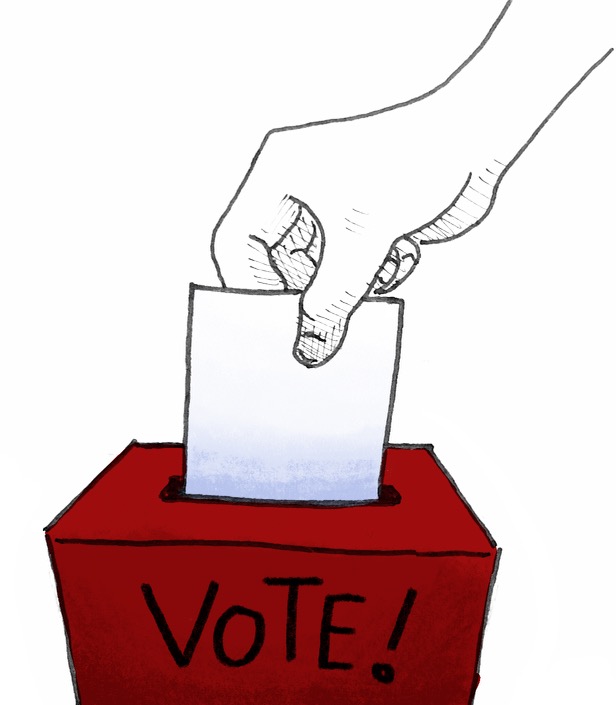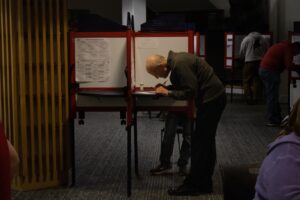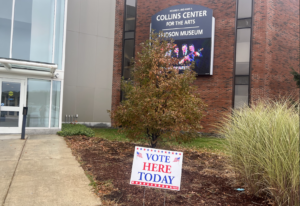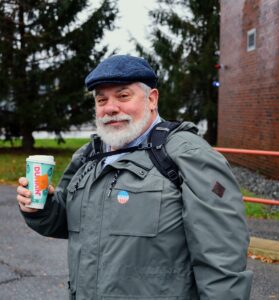Question 1:
As we approach the 2023 election season, the question of what is on Maine’s Referendum ballot starts to loom in people’s minds. This year, we have a large number of ballot questions, with eight in total.
Two of the questions on this ballot are in direct conflict. Questions 1 and 3 stand in opposition to each other. Question 3 deals with the controversial decision as to whether a consumer-owned company should take control of Central Maine Power (CMP) and Versant, which control 97% of Maine’s power.
Question 1 serves as an attempt to stop this from being enacted. It is a ballot measure designed to prevent a number of state entities from taking on a debt greater than $1 billion without receiving voter approval in a general election. It would also require a signed statement from the secretary of the treasury that explains how much a ballot question would cost voters to be included in every ballot question.
The leading campaign supporting this initiative is No Blank Checks, courtesy of the Maine Affordable Energy Coalition. According to the Maine Beacon, all of the funding to Maine Affordable Energy has been provided by Avangrid, the parent company of CMP. Avangrid is a subsidiary of the Spanish multinational power company Iberdrola.
Another group supporting this effort is Maine Energy Progress. Again according to the Maine Beacon, all of their funding has been provided by a single entity: Enmax, the parent company of Versant. Enmax is based in Calgary, Canada.
What Your Vote Means:
A Yes Vote: Supports requiring voter approval for any quasi-independent state entity, reporting entity, municipal electric district, consumer-owned transmission and distribution utility, cooperative or rural electrification cooperative to take on a debt exceeding $1 billion.
A No Vote: Opposes requiring voter approval for any quasi-independent state entity, reporting entity, municipal electric district, consumer-owned transmission and distribution utility, cooperative or rural electrification cooperative to take on a debt of more than $1 billion.
Where to Vote:
Bangor Maine: Cross Insurance Center
Orono: Collins Center of the Arts, University of Maine Campus
Old Town: Elks Lodge, 37th Fourth St.
Question 2:
One of the eight ballot measures Mainers will vote on in this upcoming election is whether or not to strengthen election spending regulations. Question 2 deals with spending on elections by foreign governments or entities with more than 5% international government ownership or control.
While federal law has prohibitions on foreign nationals spending on federal, state and local elections, this ballot measure would extend these regulations to ballot measure campaigns as well.
The primary supporter of this campaign is the Political Action Committee (PAC) Protect Maine Elections. The PAC has received $763,973.85 in contributions, according to the Maine Ethics Commission. There are no campaigns against the ballot measure.
Despite the fact that there are no campaigns working against the measure, Governor Mills vetoed an attempt to pass the initiative by the legislature stating: “While I strongly support and share the desire to find ways to prevent foreign influence in our elections, the language of this bill is too broad and would likely result in the unintended consequences of effectively silencing legitimate voices, including Maine-based businesses, in debates that would impact their interests.”
Maine would not be the first state to prohibit foreign spending on ballot measure campaigns. It would be joining seven other states: California, Colorado, Maryland, Nevada, North Dakota, South Dakota, and Washington.
What your vote will do:
A YES Vote: Supports prohibiting foreign governments, or entities with at least 5% foreign government ownership or control, from spending money to influence ballot measures or candidate elections.
A NO Vote: Opposes prohibiting foreign governments, or entities with at least 5% foreign government ownership or control, from spending money to influence ballot measures or candidate elections.
Where to Vote:
Bangor Maine: Cross Insurance Center
Orono: Collins Center of the Arts, University of Maine Campus
Old Town: Elks Lodge, 37th Fourth St.
Question 3:
The relationship between the Maine public and the largest power companies in the state has always been tumultuous. Back in 2021, a ballot question to stop the construction of a high-voltage transmission line called the New England Clean Energy Connect passed. In April of this year, a jury ruled that construction could resume in a unanimous decision.
Currently, the chance to take control of Maine’s power is being offered to voters. Question 3 is an initiative to form a public utility company, Pine Tree Power Company, which will buy out all investor-owned utilities in the state. The two largest of these companies are Central Maine Power Company (CMP) and Versant Power Company, which serve about 97% of Maine’s power needs.
This is not the first time an attempt has been made to create Pine Tree Power. Back in 2021, a bill was passed authorizing its creation. However, that bill was vetoed by Governor Janet Mills. Within that same year, the citizens’ initiative that would eventually become Question 3 was approved to gather signatures.
Pine Tree Power would be run by a board of 13 members, with seven elected to represent Maine’s senate districts and six designated expert members. The company would still be subject to oversight by the Public Utilities Commission and must pay income taxes as if it were an investor-owned utility.
The company would not be allowed to fund itself with bonds or state tax dollars. It would issue debt against future revenues in order to finance itself. The company would acquire all investor–owned utilities at fair market value, determined by an external referee.
An important aspect for voters to remember is that Pine Tree Power would be run by a non-governmental team and obligated to keep on all workers from prior to the acquisition of the purchased utilities.
The Political Action Committee (PAC) registered in support of the initiative is known as Our Power. They have raised about $1 million in support of the initiative. This does not compare to the amount of money spent by the opposing PACs. Two PACs are registered in opposition to the initiative: Maine Affordable Energy and Maine Energy Progress. Together, they have raised about $35.5 million.
The top donors to the opposition groups are Avangrid Management Company, the parent company of CMP, and Enmax, the parent company of Versant. Maine Affordable Energy, as well as Avangrid Management Company, were the top donors in support of Question 1.
What Your Vote Means:
A Yes Vote: Supports creating Pine Tree Power, an electric transmission and distribution utility that would be governed by an elected board. Pine Tree Power would then purchase and acquire all investor-owned transmission and distribution utilities in Maine.
A No Vote: Opposes the creation of Pine Tree Power.
Where to Vote:
Bangor Maine: Cross Insurance Center
Orono: Collins Center of the Arts, University of Maine Campus
Old Town: Elks Lodge, 37th Fourth St.
Question 4:
According to Forbes, about 93.2% of Maine households have at least one vehicle. This year, Question 4 concerns the right to repair for automotives in Maine.
This initiative would work to make vehicle data more accessible to owners and independent repair shops. It would require manufacturers to give the same level of access to diagnostic and repair tools to vehicle owners and independent repair shops. It would also seek to prevent manufacturers from requiring exclusive tools and software.
The way the initiative proposes to manage these new regulations is with the creation of an independent entity by the attorney general. The independent entity would be required to include representatives from automotive manufacturers, independent repair groups, aftermarket part manufacturers, retailers and new car dealers. The measure requires that the independent entity is not controlled by car manufacturers.
The measure does provide an exception to the information release requirements for security and immobilization systems.
Despite many states initiating efforts to enact right-to-repair laws, only four have passed them. In 2012 and 2020, Massachusetts passed two separate initiatives expanding the automotive right to repair.
The Political Action Committee (PAC) registered in support of Question 4 is Maine Automotive Right to Repair. They received $4.39 million in contributions and have spent $4.73 million in total expenditures. The PAC registered in opposition is Automakers and Repairers for Vehicle Repair Choice. They received $111,543 in contributions and have spent $102,047.
What Your Vote Means:
A Yes Vote: Supports requiring motor vehicle manufacturers to standardize onboard diagnostic systems and make access to vehicle systems available to vehicle owners and independent repair shops.
A No Vote: Opposes requiring motor vehicle manufacturers to standardize on-board diagnostic systems and making access to vehicle systems available to vehicle owners and independent repair shops.
Where to Vote:
Bangor Maine: Cross Insurance Center
Orono: Collins Center of the Arts, University of Maine Campus
Old Town: Elks Lodge, 37th Fourth St.
Question 5:
Maine has a long history of including citizen initiatives on ballot referendums, with the constitutional amendment that created the process being made in 1908. Half of the questions on this year’s ballot are indirectly initiated state statutes, which were created by citizen petition. One of the other four ballot questions involves a simple change to the system by which these citizen’s initiatives enter the ballot.
Question 5 changes the judicial process slightly, with proponents designed to ease the process a bit for elections staff. Rather than mandating judicial review within a hundred days of a petition being submitted to the secretary of state, they would have a hundred business days to complete the review process.
The question also entails a slight shift in the review process if a petition is submitted to the secretary of state within 30 calendar days before or after an election. With this amendment, a petition submitted within the one hundred business day period would not not start till until 30 calendar days post-election.
The legislation was introduced as LD 1012 in the 2023-2024 legislative session. On June 23 of this year, the language of the amendment was finalized, and on July 25, the legislature voted to certify the amendment for the ballot. Its primary sponsor was Representative Laura Supica of House District 22.
What Your Vote Means:
A Yes Vote: Supports the constitutional amendment to change the timeline for judicial review of initiative petitions including: Changing the review period from a hundred days to a hundred business days, and allowing the review process to begin 30 days after the general election if a petition is submitted within 30 days of the election.
A No Vote: Opposes the constitutional amendment, keeping the judicial review period a hundred days past the filing of a petition.
Where to Vote:
Bangor Maine: Cross Insurance Center
Orono: Collins Center of the Arts, University of Maine Campus
Old Town: Elks Lodge, 37th Fourth St.
Question 6:
When initially creating the Maine constitution, the Articles of Separation from Massachusetts were incorporated into the document as Article X, Section 5. Section 5 includes language about the Maine Indian Treaty Obligations.
Section 1 of Article X described the date and time of the first meeting of the state legislature as well as the number of representatives each county would have. Section 2 outlines the terms of the first office holders for the independent Maine government.
In 1876, Article X, Section 7 was amended into the Maine constitution. That amendment prohibited Sections 1, 2 and 5 from appearing in the printed versions of the Maine constitution. Despite no longer being included in printings of the constitution, all of the sections remained in full legal effect.
Question 6 on the 2023 Maine ballot is a constitutional amendment. It seeks to repeal Article X, Section 7. This would require all officially printed copies of the constitution to include the previously hidden sections.
Proponents of the measure say that it is imperative that no part of our constitution in full legal effect should be hidden from the public. Representatives of the Wabanaki Nations in Maine say that the omission of Section 5 sends a message that tribal nations are not considered important enough to have their space in the constitution and Maine history protected.
The committee registered in support of the resolution is the Restore Maine History Political Action Committee (PAC), which received $41,227 in contributions. $40,000 of which came from the League of Conservation Voters, according to the Maine Ethics Commission.
Opponents of the measure claim it is misguided, as Maine was discharged from any treaty obligations by Congress with tribal consent. The relationship between the tribal nations and Maine is defined by the Maine Indian Land Claims Settlement of 1980, which was codified into state and federal statutes.
According to the Maine Ethics Commission, the James Phinney Baxter Campaign fund has spent $17.48 in opposition to the amendment.
What Your Vote Means:
A Yes Vote: Supports requiring Sections 1, 2 and 5 of Article X, which pertains to the Maine Indian Treaty Obligations, to be included in official printed copies of the Maine Constitution. This would be done by repealing Article X, Section 7.
A No Vote: Opposes requiring Sections 1, 2 and 5 of Article X, which pertains to the Maine Indian Treaty Obligations, to be included in official printed copies of the Maine Constitution. Article X, Question 7 would not be repealed.
Where to Vote:
Bangor Maine: Cross Insurance Center
Orono: Collins Center of the Arts, University of Maine Campus
Old Town: Elks Lodge, 37th Fourth St.
Question 7:
On July 7, 2022, the First Circuit Court of Appeals ruled that Maine could not restrict petition circulation only to registered voters and Maine Residents. Collecting signatures is an essential part of getting a petition onto the ballot. The Court ruled that the restriction denied core political speech. Question 7 attempts to strike that restriction from the Maine Constitution.
In 2020, We the People, a Political Action Committee (PAC), started a litigation process that would eventually lead to the appellate court decision. The PAC had hired out-of-state circulators to get the Citizen Requirement for Voting Initiative onto the ballot for 2022. They were unsuccessful in doing so despite winning their lawsuit.
What Your Vote Means:
A Yes Vote: Supports removing a constitutional provision previously found unconstitutional by a federal appellate court. The provision says that a circulator for a citizen initiative or referendum partition must be a citizen and registered voter of Maine.
A No Vote: Opposes removing a constitutional provision previously found unconstitutional by a federal appellate court. The provision says that a circulator for a citizen initiative or referendum partition must be a citizen and registered voter of Maine.
Where to Vote:
Bangor: Cross Insurance Center
Orono: Collins Center of the Arts, University of Maine Campus
Old Town: Elks Lodge, 37th Fourth St.
Question 8:
Question 8 has already been on the Maine Ballot twice, serving as an attempt to strike a constitutional provision that prevents Mainers who are under guardianship from voting. Residents under guardianship for mental illness have fought for their right to vote for years, as a similar amendment appeared on the ballot twice in 1997 and 2000. Both times, the amendment was defeated.
In 2000, the Disability Rights Center of Maine filed a lawsuit on behalf of three individuals under guardianship for mental illness. In 2001, the U.S. District Court ruled that the restriction was unconstitutional and in violation of the Equal Protection and Due Process clauses of the 14th Amendment. After the court decided, the provision stopped being enforced, but its language remained in the Constitution.
This amendment, much like Question 7, would not create any legal change but merely remove language already found unconstitutional by the courts. A minor change included in this amendment is to replace the word “servicemen” with “servicemembers” in this constitution section.
What Your Vote Means:
A Yes Vote: Supports removing a constitutional provision that was previously found unconstitutional by a federal district court. The provision says that a person under guardianship for reasons of mental illness cannot vote for governor, senators and representatives.
A No Vote: Opposes removing a constitutional provision that was previously found unconstitutional by a federal district court, the provision says that a person under guardianship for reasons of mental illness cannot vote for governor, senators and representatives.
Where to Vote:
Bangor: Cross Insurance Center
Orono: Collins Center of the Arts, University of Maine Campus
Old Town: Elks Lodge, 37th Fourth St.




















